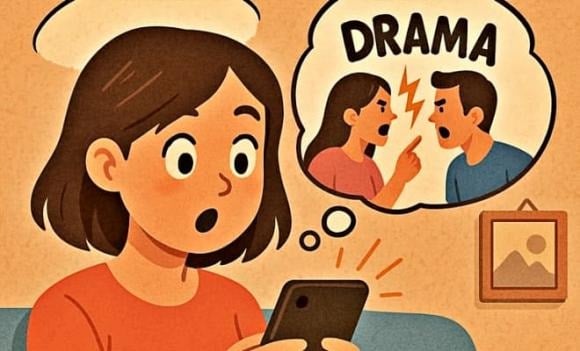Relationship dramas are not just sensational stories that capture attention, but they also reflect many psychological and social factors. However, consuming this content unconsciously can negatively impact viewers’ beliefs, psychology, and perception of relationships.
The term “drama” originates from ancient Greek, initially denoting provocative actions or events. Today, youth employ this term for controversial stories exposing scandals that significantly impact the community and society, attracting widespread attention.
On Vietnamese social media platforms, shocking statements, immoral actions, and relationship dramas often spark heated debates. Countless groups with millions of followers constantly share and discuss these stories.
According to psychological consultant Giang Kate (Nguyen Huong Giang), relationship dramas are not merely entertainment but can profoundly influence viewers’ psychology, beliefs, and perception of relationships.
Group Supporting the Betrayed
Reason for Following: They empathize with the victim, having experienced similar wounds themselves.
Inner Psychology: These individuals might carry unhealed wounds from their past or fears of betrayal, easily identifying with the drama’s characters and reacting intensely.
Positive Impact: Following these stories can help them recognize and deal with personal wounds while promoting awareness about honesty and fidelity in society.
Negative Impact: If the betrayer goes unpunished, they may lose faith in love and feel disillusioned about social justice.

Group Defending the Betrayer
Reason for Following: They believe in individual freedom or hold more flexible views on love.
Inner Psychology: These individuals might have experienced or witnessed similar situations, seeking to rationalize or justify the behavior to alleviate guilt.
Positive Impact: Following these stories broadens perspectives on love, encourages dialogue, and fosters mutual understanding between parties.
Negative Impact: However, this can also lead to rationalizing betrayal, undermining honest values in relationships.
Group of Skeptical Followers
Reason for Following: They seek to verify the truth and avoid being influenced by misinformation.
Inner Psychology: These individuals might have been falsely accused or witnessed similar circumstances, so they want to fact-check before believing.

Positive Impact: Maintaining skepticism hones their critical thinking skills and prevents them from being swayed by one-sided information.
Negative Impact: However, they may fall into excessive evidence-seeking, wasting time on drama without gaining real value.
Group Watching Drama for Entertainment
Reason for Following: They find drama appealing as a reality show, offering excitement and drama.
Inner Psychology: These individuals seek excitement to escape mundane life, sometimes disconnecting them from reality.
Positive Impact: Following drama can provide short-term entertainment, helping to temporarily forget life’s stresses and anxieties.
Negative Impact: However, overindulgence can lead to a “drama addiction,” causing them to lose faith in love and become pessimistic about relationships.
General Negative Impact
Excessive exposure to drama can influence viewers’ psychology, alter their life perspectives, and induce unhealthy stress. Thus, staying vigilant, filtering information, and preventing drama from shaking one’s faith in love and the world are crucial.
The Spooky Month: Night-Time Activities to Avoid
In folklore, the seventh month of the lunar calendar is known as the “Month of the Hungry Ghosts”. It is believed that during this time, hungry and restless spirits roam the Earth, seeking sustenance and relief from their suffering. The nights are particularly active, with numerous spirits emerging from the shadows.


































